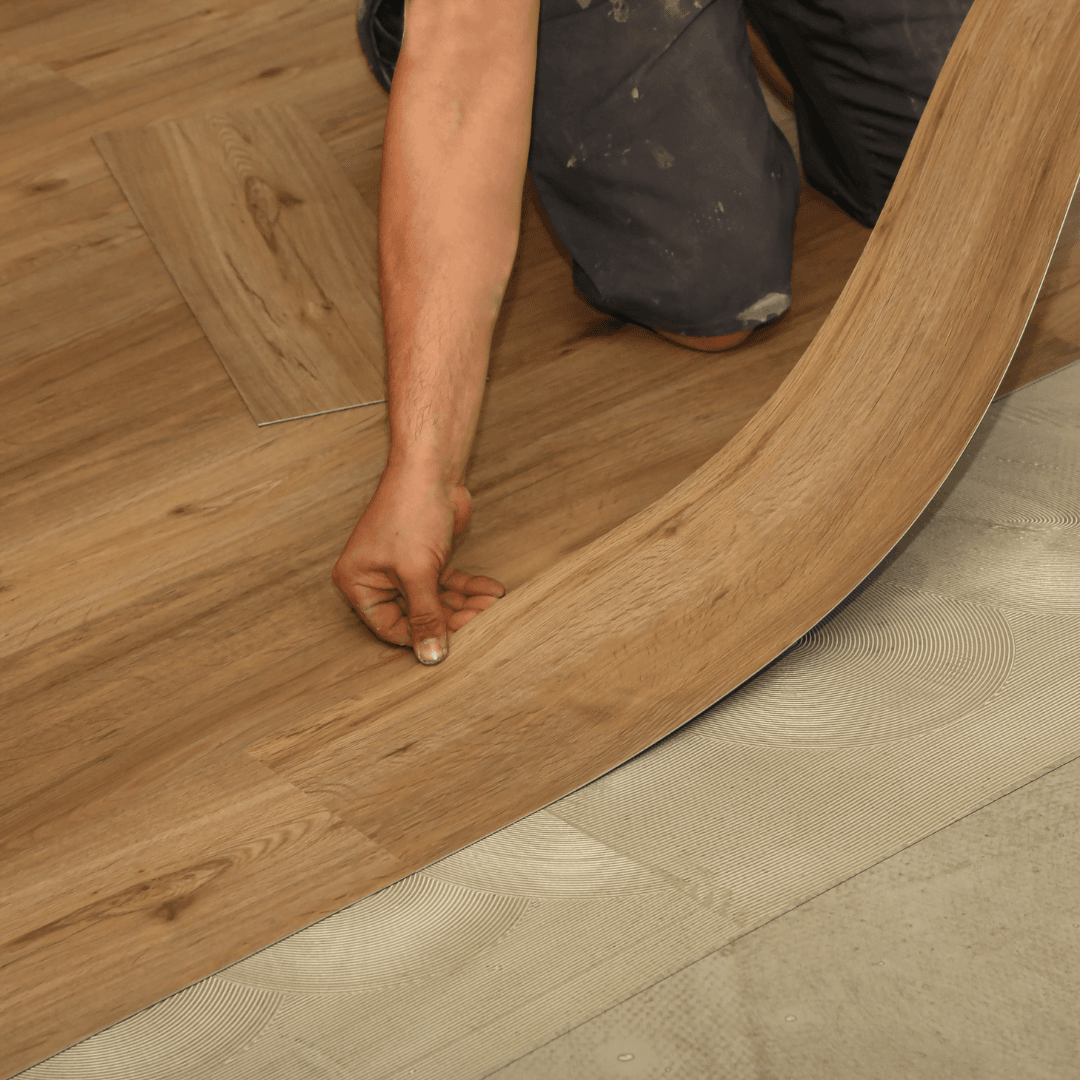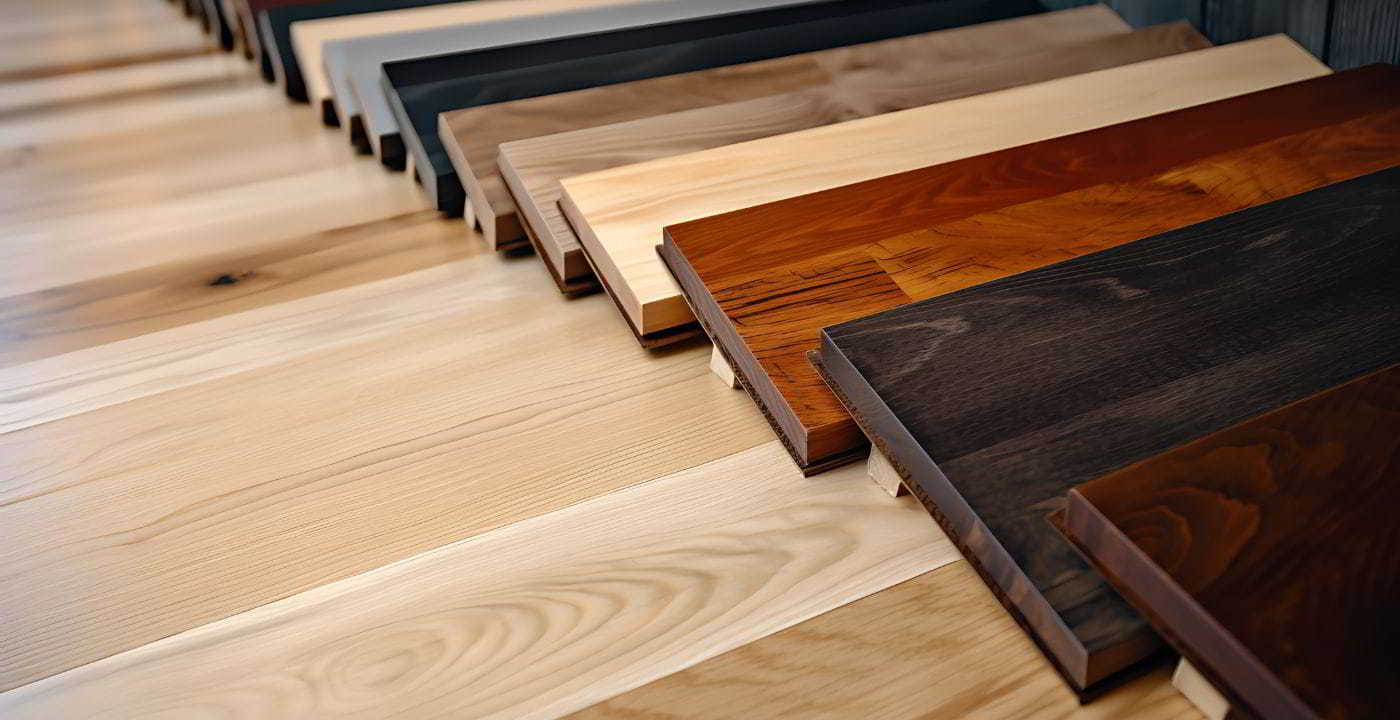
Hardwood Flooring Cost Breakdown
Here’s a short look at the cost per sq ft:
| Size by Square Feet | Low-End Estimate | Average Cost | High-End Estimate |
|---|---|---|---|
| 500 | $3,000 | $7,750 | $11,500 |
| 1,000 | $6,000 | $14,500 | $23,000 |
| 1,500 | $9,000 | $21,750 | $34,500 |
| 2,000 | $12,000 | $29,000 | $46,000 |
| 2,500 | $15,000 | $36,250 | $57,500 |
| 3,000 | $18,000 | $43,500 | $69,000 |
Materials: $4 to $12 per square foot
The kind and quality of hardwood flooring affect the total cost. Choices include common oak and maple to unique types like Brazilian cherry and teak. Each has its own features and prices.
Domestic Hardwood
Domestic hardwoods like oak, maple, and hickory are easy to find and usually cost $4 to $8 per square foot. These woods are strong and flexible, making them a favorite for homes.
Exotic Hardwood
Exotic hardwoods like Brazilian cherry, teak, and mahogany are known for their special grain and rich colors. They are more expensive, costing $8 to $12 per square foot. Many people love them for their unique look.
| Hardwood Species | Average Cost per Square Foot (Materials Only) | Average Total Cost per Square Foot (Including Installation) |
|---|---|---|
| Oak | $4 – $8 | $8 – $15 |
| Maple | $5 – $9 | $9 – $16 |
| Hickory | $6 – $10 | $10 – $17 |
| Cherry | $7 – $11 | $11 – $18 |
| Walnut | $8 – $12 | $12 – $19 |
| Ash | $6 – $10 | $10 – $17 |
| Birch | $5 – $9 | $9 – $16 |
| Teak | $9 – $13 | $13 – $20 |
| Mahogany | $10 – $14 | $14 – $21 |
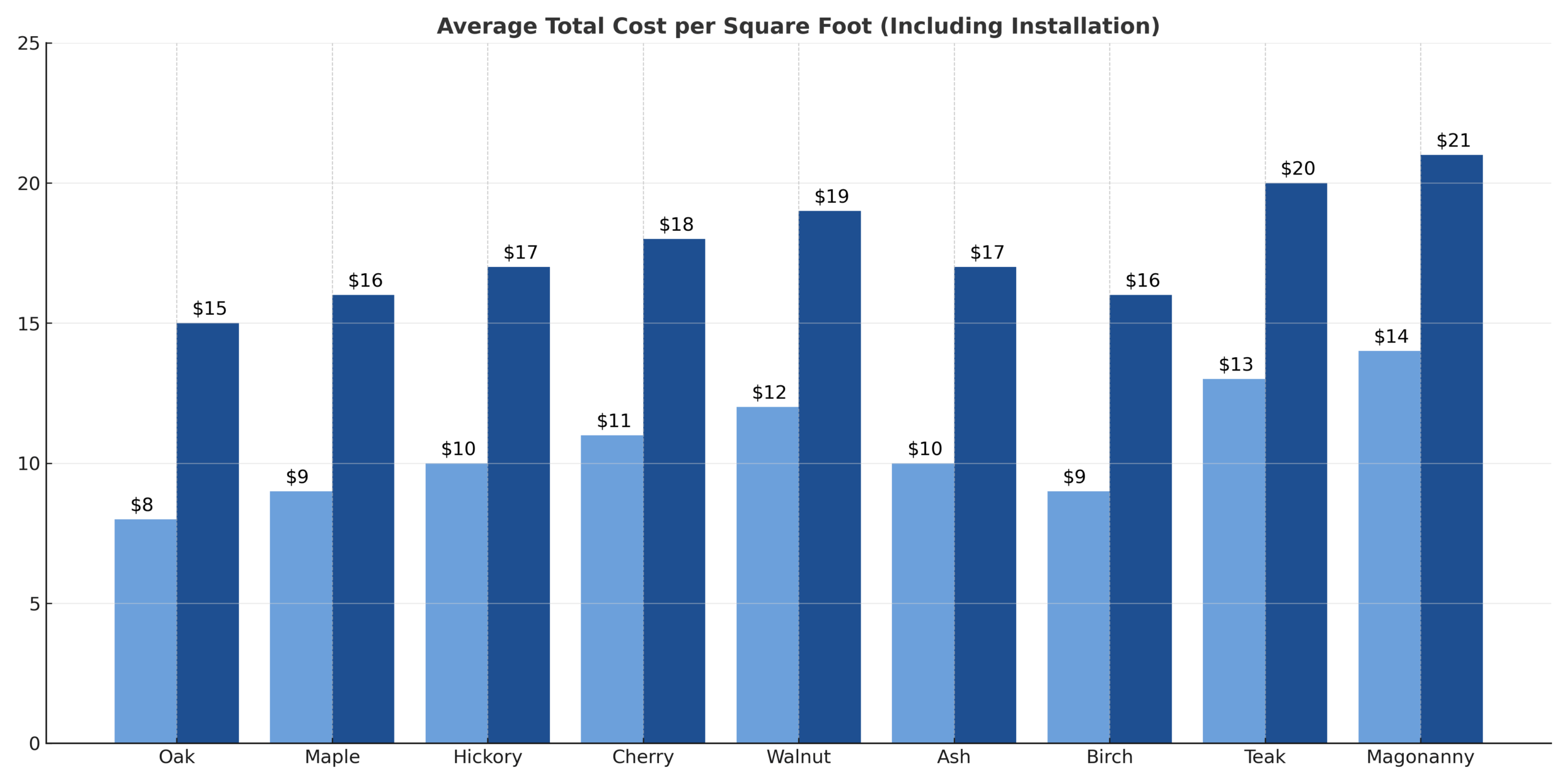
Labor: $4 to $8 per square foot
Labor costs can be 50% to 70% of the total price. Professional installation makes sure the hardwood flooring looks perfect.
Labor costs usually include installing the floor material and any needed subfloor work and finishing touches.
Installation
Installing hardwood floors needs skill for a smooth look. Installers may charge $4 to $8 per square foot for labor, depending on the project’s difficulty and local rates.
Finishing
Besides installation, labor costs can include finishing services like sanding, staining, and sealing. These steps improve the floor’s look and strength.
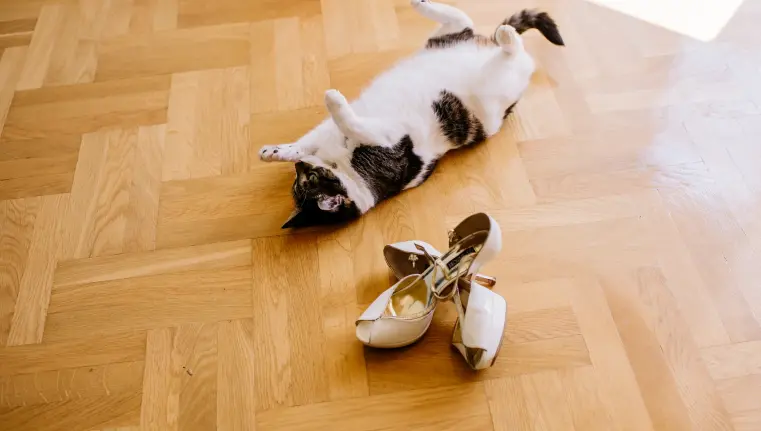
Subfloor Preparation: $1 to $2 per square foot
Preparing the subfloor is important for making hardwood floors last long. This can include fixing uneven spots, repairing damage, and adding moisture barriers.
Leveling
If the subfloor is bumpy or broken, leveling is needed to make it smooth for hardwood. The cost for leveling is usually $1 to $2 per square foot, based on the work needed.
Moisture Protection
Moisture can harm hardwood floors, so a moisture barrier is important, especially in damp areas. The cost to install a moisture barrier is usually $1 to $2 per square foot.
Removal of Existing Flooring: $1 to $3 per square foot
Before putting in new hardwood floors, you might need to take out old floors like carpet, tile, or laminate. This helps make a clean and flat surface for the new floors.
Carpet Removal
Taking out carpet usually costs $1 to $2 per square foot. The price depends on the carpet type and if there is padding underneath.
Tile or Laminate Removal
Taking out tile or laminate might need more work and tools, so it costs a bit more, from $2 to $3 per square foot.
Hardwood Flooring Cost Summary:
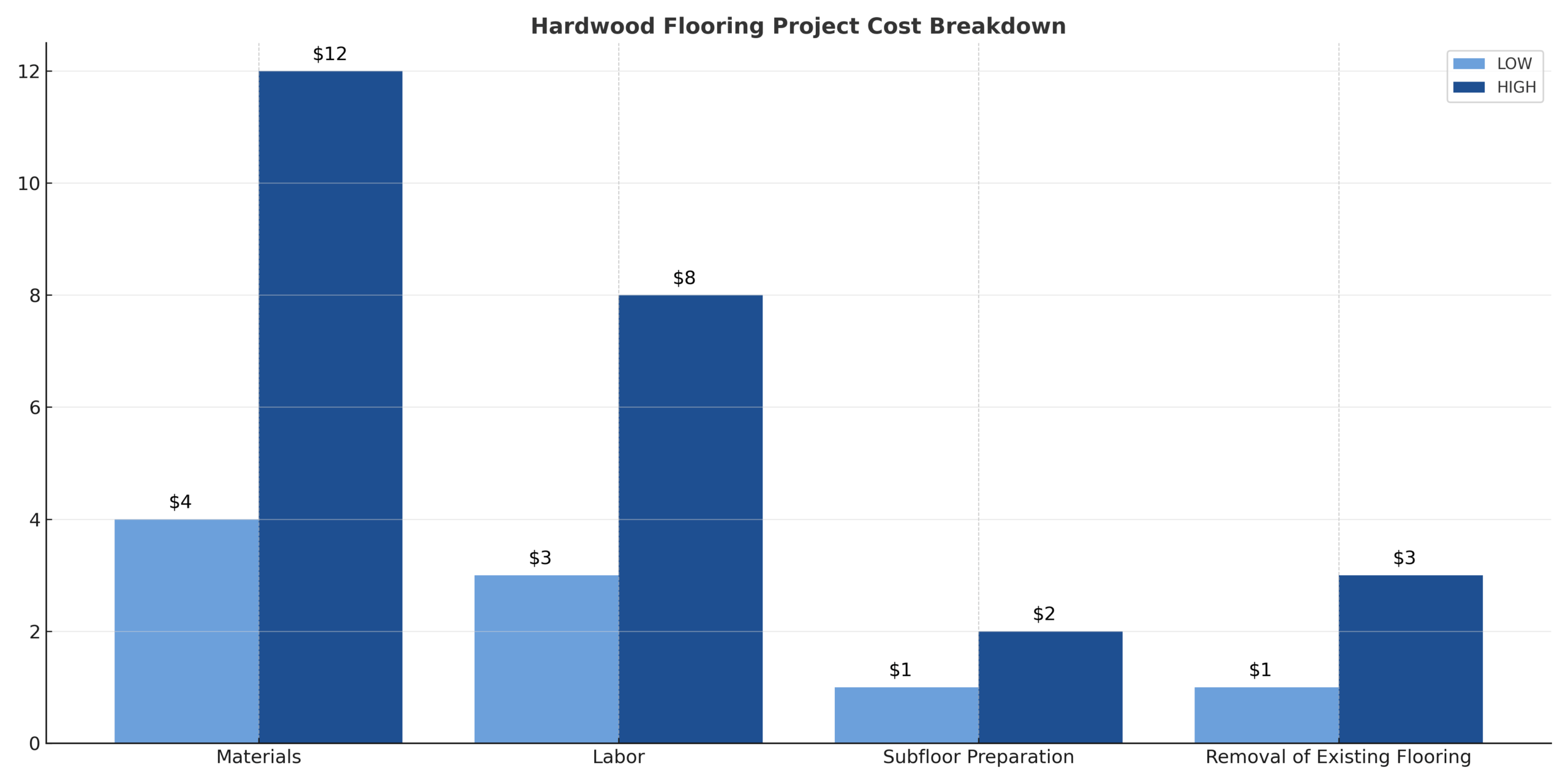
Solid Hardwood Flooring Installation
Solid hardwood flooring is known for its classic look and strength. Installing it usually costs between $11 and $25 per square foot, covering materials and labor.
The price can change based on the wood type, installation difficulty, and any extra services needed.
Installation Method
The way the floor is installed affects the cost too. Nail-down installation is usually cheaper than glue-down or floating methods.
Additional Services
Sometimes, extra work is needed for solid hardwood flooring, which can raise the cost. This includes preparing the floor, like leveling or adding a moisture barrier, for a smooth and lasting finish.
Adding stain or finish to the floors might cost more but makes them look better and last longer.
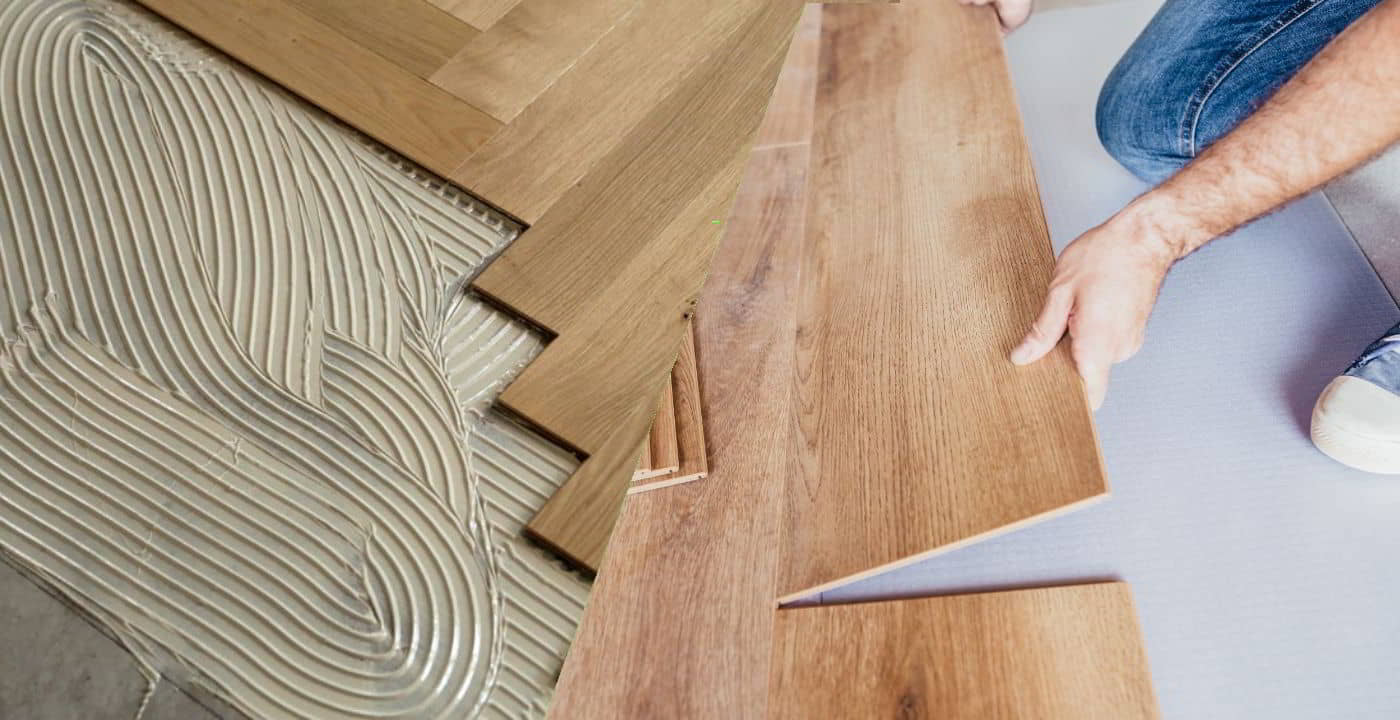
Engineered Hardwood Flooring Installation
Engineered hardwood flooring is strong and flexible, a favorite for many homes. The cost for installing it is usually between $7 and $20 per square foot, covering both materials and labor.
Special woods or finishes can make it pricier. Thicker veneers on engineered wood often cost more.
Installation Method
The way you install engineered hardwood can change the price. Floating installations, where planks aren’t fixed to the floor, are usually faster and cheaper than glue-down or nail-down methods.
Complex jobs, like working over radiant heating or uneven floors, may cost more.
Factors that Affect Hardwood Flooring Costs
| Cost Factor | Details |
|---|---|
| Wood Type | Hardwood flooring comes in many types, each with different prices. Common choices include oak, maple, cherry, and walnut. Exotic woods like Brazilian cherry or teak cost more. |
| Wood Quality | The wood’s quality affects its price. Engineered hardwood is often less costly than solid hardwood but looks similar. |
| Installation Method | The installation method can affect costs. Nail-down and glue-down are usually cheaper than floating floors. |
| Room Size | Bigger rooms need more materials and work, which costs more. |
| Subfloor Condition | If the subfloor needs fixing or leveling before installation, it adds to the cost. |
| Additional Features | Extras like borders, inlays, or custom designs can raise the cost. |
| Additional Services | More services include removing old floors, leveling subfloors, replacing underlayment, or adding baseboards. |
Professional vs DIY Flooring Installation
For hardwood flooring, you can hire a pro or do it yourself. Learn more about DIY flooring tips.
Each choice has its pros and cons. Knowing these helps you pick the best option for your budget and skills.
Professional Installation
Advantages
- Expertise: Pros know how to install hardwood floors well.
- Efficiency: They use special tools to work fast and avoid mistakes.
- Warranty: Many offer a guarantee on their work, fixing any problems for free.
- Professional Finish: They handle finishing touches like sanding and sealing for a smooth look.
Drawbacks
- Cost: Hiring professionals costs more than doing it yourself.
DIY Installation
Advantages
- Save money: Doing it yourself saves on labor costs.
- Flexibility and control: Work at your own speed and make changes as needed.
- Learn new skills: Gain experience and learn by doing.
Drawbacks
- Risks mistakes like uneven floors or bad finishes.
- Demanding and time-consuming with heavy lifting and long hours.
Ready to Turn Your Hardwood Flooring Vision Into Reality?
Picking the right hardwood flooring is important. Now that you know the main cost factors, you’re closer to creating your ideal space. But you don’t need to do it alone.
We’d love to guide you through hardwood flooring in a free talk with our flooring installation experts. From choosing wood types to learning about installation and costs, our team ensures you get floors you’ll adore for years.
Contact us today to set up your free home flooring consultation and check if we serve your area.


